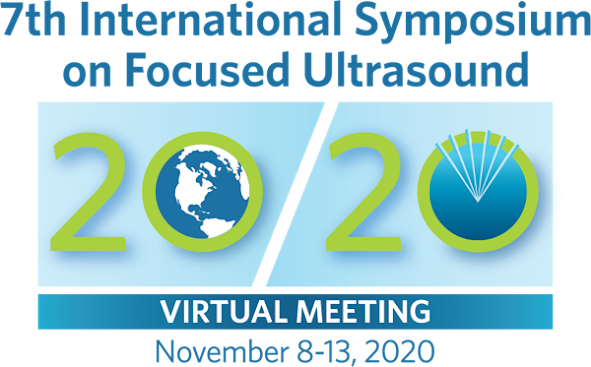NaviFUS highlights clinical trial data and device capabilities at virtual International Focused Ultrasound Symposium
TAIPEI, Nov. 27, 2020 /PRNewswire/ -- The 7th International Focused Ultrasound Symposium organized by the U.S. Focused Ultrasound Foundation took place from 11/9 to 11/13 in virtual format this year due to the Covid-19 epidemic. During the 5-day conference, participants presented and exchanged information on the newest developments and applications of non-invasive Focused Ultrasound (FUS) technology. Likely the largest FUS event of the year, the virtual conference hosted over 1,700 industry, medical, and academic professionals from all over the world.
NaviFUS was heavily involved in the virtual conference this year; posting 3 recorded oral presentations and 1 poster presentation, and also participating in 2 panel discussions during the first two days of the conference. Notable highlights from NaviFUS at the conference include its Epilepsy neuromodulation clinical trial that just finished its safety phase, preliminary progress from its FUS combined with Avastin in rGBM patients clinical trial, upcoming FUS combined with radiotherapy in rGBM clinical trial, and newly developed Passive Cavitation Detection (PCD) function in its BBB-opening System, all of which have received attention and interest at the conference.
NaviFUS' Epilepsy trial (NCT03860298) conducted at Taipei Veterans General Hospital has successfully completed 6 subjects since October, and the preliminary results were presented in recorded video format at the meeting. Notable differences in onset of symptoms and changes in brain electrical activity before and after FUS treatment was observed in some patients. Corresponding neurophysiological responses caused by NaviFUS' Neuromodulation System could also be tracked, which when combined with the other clinical data, provides support for the safety and feasibility of NaviFUS' neuromodulation application. In the online Epilepsy session, the PI for the trial, Dr. Hsiang-Yu Yu, discussed the trial results with other field experts, while engaging in other high-level discourse regarding the current landscape of Epilepsy therapies. In contrast to invasive treatments such as VNS/DBS which require implanted electrodes, or High-Intensity Focused Ultrasound (HIFUS) which can cause burns from ablation, neuromodulation provides a non-invasive method that does not cause direct physical damage, making it extremely promising and competitive among Epilepsy therapies. As such, NaviFUS is planning the next phase of the trial while simultaneously collaborating with its international partner in Stanford University in the U.S.
NaviFUS and their collaborators at Chang Gung Memorial Hospital Linkou, Dr. Kuo-Chen Wei and his team, also presented results from its rGBM clinical trials this year at the symposium. These included the completed safety trial on 6 rGBM patients (NCT03626896) and combination Avastin + FUS trial (NCT04446416) that began recruiting in August. The first patient in the Avastin + FUS trial is currently enrolled in Avastin treatment and has received FUS treatment every 2 weeks for the last 18 weeks, with no signs of adverse events caused by NaviFUS System. During the Brain Tumor online session on Nov 10, besides these clinical trial results, the NaviFUS team also presented preclinical data on another combination radiotherapy + FUS project, which showed the exciting finding that FUS-mediated opening of the BBB can improve the hypoxia regions of brain tumors by increasing oxygen concentration and enhancing the radiotherapy effect. NaviFUS plans to test this in a future trial as a third-line therapy. Currently, regulatory consultation and clinical trial planning have been completed in Taiwan, and NaviFUS expects to submit dossier to the Taiwan FDA before the end of the year.
The newly developed Passive Cavitation Detection (PCD) function was also highlighted in video and poster presentations at the conference. This new technology automatically reduces the ultrasonic output when it detects that it has reached the critical point of the cavitation effect, which helps prevent shockwaves from damaging surrounding blood vessels; thus, it provides an instantaneous safety net that can allow the entire treatment to be completed more safely and effectively. The NaviFUS System currently being used in the combination Avastin + FUS clinical trial and future planned clinical trials – like the Alzheimer's Disease clinical trial in collaboration with Genovate Biotech in Australia – all include this new function to benefit the patients in the future.
"To be heavily involved on an international stage and present these exciting preclinical and clinical results is a testament of NaviFUS' growing imprint in the FUS industry and leading status in clinical FUS applications." says NaviFUS Chairman Dr. Jen Chen. Besides continuing to fine-tune the NaviFUS System's safety and therapeutic functions, NaviFUS is actively seeking international collaborators to help commercialize its NaviFUS System for research purposes and hopes to make quick progress in the near future.


Comments
Post a Comment